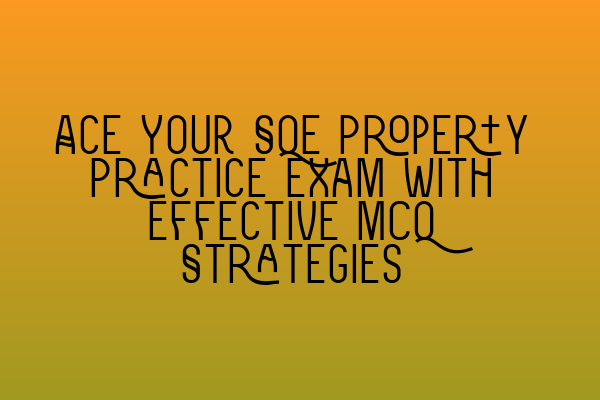Ace Your SQE Property Practice Exam with Effective MCQ Strategies
Preparing for the SQE Property Practice Exam requires a deep understanding of property law concepts and the ability to apply them in real-life scenarios. One of the most challenging aspects of the exam is the multiple-choice questions (MCQs) section. To help you excel in this section, we have put together effective MCQ strategies that will increase your chances of success. In this article, we will guide you through these strategies while providing valuable insights into property law principles.
1. Understand the key concepts
Before jumping into MCQ practice sessions, it’s essential to have a solid understanding of the key concepts in property law. This includes topics such as ownership rights, transfer of property, landlord-tenant relationships, easements, and covenants. Make sure you have a clear grasp of these concepts before moving forward.
To further enhance your understanding of property law principles, we recommend reading our previous articles on related topics:
- Understanding Contractual Capacity: Rights and Limitations
- Interactive SQE Mock Tests for Contract Law: Test Your Knowledge
- Join Our SQE Contract Law Webinars: Expert Insights and Guidance
- Contract Law Reforms: An Analysis of Recent Changes
- Parties in a Contract: Rights and Responsibilities
2. Familiarize yourself with the exam format
The SQE Property Practice Exam consists of a series of MCQs that assess your knowledge and application of property law principles. To maximize your score, take the time to familiarize yourself with the exam format and understand the expectations of the examiners.
By practicing with sample MCQs, you can gain insight into the types of questions that might be asked and the level of complexity involved. This will help you become accustomed to the exam format and improve your speed and accuracy in answering the questions.
3. Read the question carefully
One common mistake that candidates make in MCQ exams is rushing to answer the question without fully understanding it. Take the time to carefully read each question and ensure you understand what is being asked. Pay attention to any qualifiers, such as “most likely” or “least likely,” as they can significantly impact your answer.
It’s also important to analyze the scenario provided in the question. Identify the relevant property law principles that apply and consider the implications of each choice before making your selection.
4. Use the process of elimination
If you are unsure about the correct answer to a particular MCQ, utilize the process of elimination to narrow down your options. Start by eliminating any choices that are clearly incorrect or irrelevant to the scenario. This increases your chances of selecting the correct answer even if you are uncertain.
5. Review and learn from your mistakes
After completing practice MCQs, take the time to review your answers and understand the reasoning behind the correct answers. Identify any patterns in your mistakes and areas where you need to improve. This will help you focus your studying efforts and prevent making the same errors in the actual exam.
Conclusion
Acing the SQE Property Practice Exam requires a combination of in-depth knowledge and effective exam strategies. By understanding the key concepts, familiarizing yourself with the exam format, reading questions carefully, using the process of elimination, and reviewing your mistakes, you can significantly improve your performance in the MCQ section.
For more guidance and resources on property law and other relevant topics, we invite you to explore our related articles:
- Understanding Contractual Capacity: Rights and Limitations
- Interactive SQE Mock Tests for Contract Law: Test Your Knowledge
- Join Our SQE Contract Law Webinars: Expert Insights and Guidance
- Contract Law Reforms: An Analysis of Recent Changes
- Parties in a Contract: Rights and Responsibilities
At SQE Property Law & Land Law, we are committed to helping aspiring solicitors succeed in their exams. Stay tuned for more informative articles and resources that will assist you in your journey towards becoming a property law expert.
